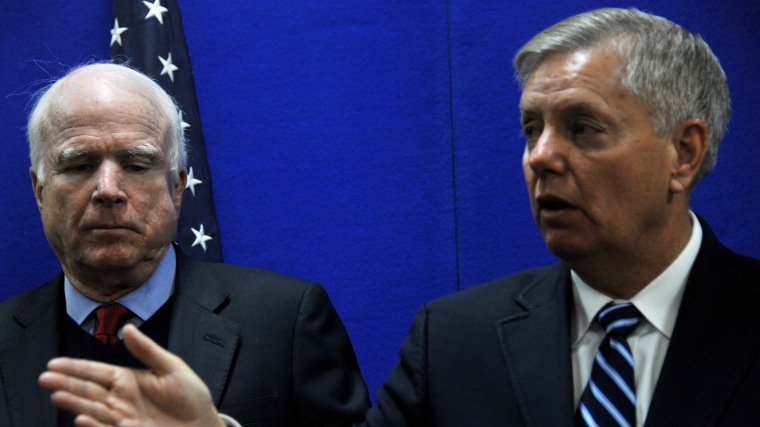Amid deepening violence across Eastern Europe and the Middle East, Americans are recoiling from direct engagement overseas and oppose U.S. involvement in Afghanistan, Iraq, Syria and Ukraine by large margins, according to a POLITICO poll of 2014 battleground voters. Asked whether the U.S should do more to counter Russian aggression in Ukraine, just 17 percent answered in the affirmative.... More than three-quarters of likely voters say they support plans to withdraw all troops from Afghanistan by the end of 2016. Only 23 percent oppose the plan. Forty-four percent of likely voters favor less involvement in Iraq's civil war, versus 19 percent who favor more involvement and 23 percent who say the current level of involvement is appropriate.... Likely voters prefer less involvement in Syria's civil war over more involvement, 42 percent to 15 percent.
Public attitudes on foreign policy clear as mud
On foreign policy, Americans agree with the party they disagree with. If that doesn't sound rational, it's because it isn't.

Politico's latest poll focused exclusively on voters in states and districts with the most competitive Senate and House races, and on foreign policy, voters' attitudes lean heavily in one direction.
The results aren't even close. The public heard quite a bit from Dick Cheney, and John McCain, and Lindsey Graham, and a cavalcade of Republican lawmakers who seem to dominate the airwaves -- but voters are running in the other direction.
Less than a fifth of these "battleground" voters are buying what McCain & Co. are selling. We're looking at an electorate that wants less of a confrontation in Iraq, less of a presence in Afghanistan, less engagement in Iraq, and less involvement in Syria.
And yet, the exact same poll also included this result: "On the issue of foreign policy specifically, voters say they trust Republicans over Democrats by 7 points, 39 percent to 32 percent."
Got that? Americans clearly reject the Republican foreign policy on Russia, Iraq, Afghanistan, and Syria. Americans also say they're inclined to trust Republicans on foreign policy.
You can almost hear the staffers at the DNC banging their heads against their desks. Americans agree with Democrats on foreign policy, but trust Republicans on foreign policy. If that doesn't seem rational, that's because it isn't.
Kevin Drum summarized the bottom line: "Americans prefer the actual foreign policy of Democrats, but they prefer the rhetorical foreign policy of Republicans. They want lots of bluster and chest thumping, but without much in the way of serious action."
I suspect that's probably true. The other possibility is that much of the country has no idea what the Republican vision on foreign policy is, so these voters are just going by some broad understanding of branding -- "everyone knows" foreign policy is a GOP issue, just as "everyone knows" health care, education, and the environment are Democratic issues.
Maybe Americans agree with the party they disagree with because they don't fully appreciate what Cheney, McCain, Graham, et al have in mind?